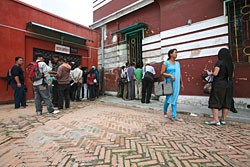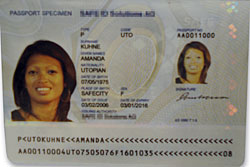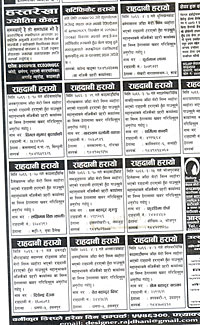 KIRAN PANDAY |
The agreement, mediated by the UN's International Civil Aviation Organization, allows for the validity of non-MRP passports until October 2015. But they can't be distributed after March 2010, which means the government has only seven months to start issuing MRP passports exclusively.
"Previously issued passports that are still valid can be used for travel until October 2015," says Hemlal Sharma Bhattarai of the Ministry of Foreign Affairs (MoFA), adding, "it is not compulsory for everyone to switch to the new passport just yet."
It is this "why me worry?" attitude of leaving everything till the last minute that is going to make international travel a lot more difficult for Nepalis in the coming years. MRPs will make travelling easier since airport officials can easily check their validity by swiping them through a machine. They will also help governments cut down on passport fraud since illegal or duplicate passports can be quickly and digitally invalidated.
At the rate Nepal is going, we will make the switch to MRPs long after the rest of the world since we almost certainly won't meet the 2010 deadline. This means Nepali travellers will be stuck in long airport queues as immigration officials manually check their documents and enter details on computers, while other nationalities zoom through. Nepali travelers, already singled out for special checks at airports around the world, will now face more harassment.
Things are moving at a snail's pace at MoFA. Officials have so far been busy pushing paper on the printing, supply and delivery of the new passports. It has made late arrangements for the installation of the necessary equipment and the organisation and management of staff, and only just approved the building design prepared by the Construction Division this month.
 REPUBLIC OF UTOPIA: A sample of a machine-readable passport that will be mandatory from April 2010. The Nepal government has only eight months to start issuing these passports. |
Bhattarai says the delay was exacerbated by the shifting of MoFA from Sital Niwas to the former royal palace in Narayanhiti, which took almost seven months. With time quickly running out, MoFA wants to begin screening contractors to supply printing materials and install the necessary equipment soon.
For this purpose, it will likely call for a prequalification bid this week and a global bid within a month and a half. The ministry hasn't begun work on the building which will house the MRP printers and equipment since it is waiting for the District Technical Office to announce this year's prices for construction materials, but hopes to identify a builder soon.
The builder will face a tall order since the planned five-storey building north of Narayanhiti must be completed within five months to meet the 2010 deadline, but ministry officials are confident it can be done. "We will have to mobilise workers for 24 hours in three shifts to complete the construction in five months," says Uma Devi Sangachhe, chief divisional engineer at the Construction Division.
The government will also have to install expensive Optical Character Recognition Machines that can read MRPs at nine entry points around the country, including Tribhuvan International Airport, Kakarbhitta, Birgunj, Tatopani, Bhairahawa, Nepalgunj, Dhangadhi and Gadda Chauki, Mahendranagar.
If MRPs don't take off pretty soon, neither will we.
Ever wondered about these ads?
 |
When people lose their passports, they are supposed to print an ad in a national daily and request a police enquiry before applying for a new one, but these investigations are rarely undertaken.
"We cannot investigate even when we're certain they aren't genuine," admits Deepak Adhikari, under-secretary at the Ministry of Foreign Affairs, where he heads the visa section. State authorities guess that a staggering 90 per cent of the petitions are fraudulent, but are under pressure to issue new passports immediately.
"Nepal is probably the only country where a replacement passport is issued so easily," Adhikari says.
There are four main reasons why people pretend to lose their passports in order to get a new one. Students who apply to study abroad and are rejected worry that the visa rejection stamp in their passports will disqualify them the next time they apply, so seek fresh documents. People interested in working for overseas companies must surrender their passports to them, which means they need a separate passport for every company they are interested in. Those who have been deported are hassled at international airports because their passports have stamps that advertise the fact and can't be erased. Some simply need new passports to get away with a crime or run illegal passport rackets of their own.
Others deliberately invalidate their passports by ripping pages or smudging information, so they don't have to lie about having lost a passport in order to qualify for a new one.
The introduction of Machine Readable Passports (MRP) will significantly reduce cases of fraud since their digitally encoded information can't be corrupted. Although they can be lost, it will be less difficult to replace them. Authorities can digitally invalidate old ones so people can't illegally hold two passports.
On the other hand, authorities have to inform diplomatic missions and immigration offices abroad of lost non-MRP passports before they issue new passports, which could be very troublesome. Although some people inform the ministry if they find their old passports, this is rare.
Without updated technology, Adhikari laments, "There is nothing we can do to dissuade a dishonest and unethical individual." And there seem to be quite a few of them about.
Dewan Rai


